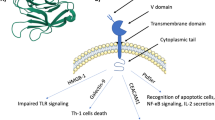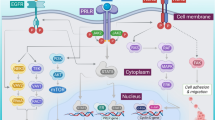Abstract
Background
Tumor human leukocyte antigen class I (HLA-I) expression plays an important role in T cell-mediated tumor rejection. Loss of HLA-I is associated with cancer progression and resistance to immunotherapy, including antibodies blocking programmed death-1/programmed death-ligand 1 (PD-1/PD-L1) signaling. Our objective was to analyze a correlation between HLA-I, tumor immune infiltration, and PD-L1/PD-1 axis in bladder cancer in association with the clinicopathologic features of patients.
Methods
We analyzed 85 cryopreserved bladder tumors by immunohistochemistry to investigate the expression of HLA-I, PD-L1, PD-1, CD3, CD8, and CXC chemokine receptor 4 (CXCR4). The results were correlated with tumor stage and other clinicopathologic variables of patients.
Results
We found a strong positive correlation between tumor HLA-I expression and infiltration with CD3+ and CD8 + T cells. PD-L1 expression was positive in 15.5% of tumors and heterogeneous in 40.5%, and was linked to a more advanced tumor stage. The majority of HLA-I-positive/heterogeneous tumors also expressed PD-L1 and PD-1, which were significantly correlated with each other and with lymphocyte infiltration. Interestingly, the analysis of the simultaneous expression of both markers revealed that 85.2% of tumors with a positive/heterogeneous HLA-I phenotype and negative for PD-L1 were mostly non-invasive, representing a ‘tumor rejection’ immune phenotype.
Conclusions
High tumor HLA-I expression with absence of PD-L1 provides bladder cancer with an immune rejection mechanism. Evaluation of PD-L1 and HLA-I together should be considered in bladder cancer and may provide a new predictive biomarker of tumor invasiveness and of the response to ‘immune checkpoint’ therapy.



Similar content being viewed by others
References
Ferlay J, Bray F, Forman D, et al. GLOBOCAN 2008 v1.2, Cancer Incidence and Mortality Worldwide: IARC Cancer Base No. 10. Lyon: International Agency for Research on Cancer; 2010.
Burger M, Catto JW, Dalbagni G, et al. Epidemiology and risk factors of urothelial bladder cancer. Eur Urol. 2013;63(2):234–41.
Bosetti C, Bertuccio P, Chatenoud L, et al. Trends in mortality from urologic cancers in Europe, 1970–2008. Eur Urol. 2011;60(1):1–15.
Mendes F, Domingues C, Rodrigues-Santos P, et al. The role of immune system exhaustion on cancer cell escape and anti-tumor immune induction after irradiation. Biochimica et Biophysica Acta. 2016;1865(2):168–75.
Liu Y, Cao X. Immunosuppressive cells in tumor immune escape and metastasis. J Mol Med. 2015;94(5):509–22.
Aptsiauri N, Garcia-Lora AM, Cabrera T. MHC Class I antigens in malignant cells: immune escape and response to immunotherapy. New York: Springer Briefs in Cancer Research; 2013. p. 6.
Spranger S. Mechanisms of tumor escape in the context of the T cell-inflamed and the non-T cell-inflamed tumor microenvironment. Int Immunol. 2016;58:7250–7.
Ma W, Gilligan BM, Yuan J, Li T. Current status and perspectives in translacional biomarker reserach for PD-1/PD-L1 immune ckeckpoint blockade therapy. J Hematol Oncol. 2016;9(47):1–21.
Velcheti V, Schalper KA, Carvajal DE, et al. Programmed death ligand-1 expression in non-small cell lung cancer. Lab Investig. 2014;94(1):107–16.
Aptsiauri N, Cabrera T, Garcia-Lora AM, Lopez-Nevot MA, Ruiz-Cabello F, Garrido F. MHC class I antigens and immune surveillance in transformed cells. Int Rev Cytol. 2007;256:139–89.
Cabrera T, Collado A, Fernandez MA, Ferron A, Sancho J, Ruiz-Cabello F, et al. High frequency of altered HLA class I phenotypes in invasive colorectal carcinomas. Tissue Antigens. 1998;52(2):114–123.
Cabrera T, Pedrajas G, Cozar JM, Garrido F, Vicente J, Tallada M, et al. HLA class I expression in bladder carcinomas. Tissue Antigens. 2003;62(4):324–7.
Garrido F, Cabrera T, Aptsiauri N. ‘Hard’ and ‘soft’ lesions underlying the HLA Class I alterations in cancer cells: implications for immunotherapy. Int J Cancer. 2010;127:249–56.
Maleno I, Aptsiauri N, Cabrera T, Gallego A, Paschen A, Lopez-Nevot MA, et al. Frequent loss of heterozygosity in the β2-microglobulin region of chromosome 15 in primary human tumors. Immunogenetics. 2011;63(2):65–71.
Maleno I, Romero JM, Cabrera T. LOH at 6p 21.3 region and HLA class I altered phenotypes in bladder carcinomas. Immunogenetics. 2006;58(7):503–10.
Romero JM, Jiménez P, Cabrera T, et al. Coordinated downregulation of the antigen presentation machinery and HLA class I/beta2-microglobulin complex is responsible for HLA-ABC loss in bladder cancer. Int J Cancer. 2005;113(4):605–10.
Carretero R, Cabrera T, Gil H, et al. Bacillus Calmette-Guerin immunotherapy of bladder cancer induces selection of human leukocyte antigen class I-deficient tumor cells. Int J Cancer. 2011;129(4):839–46.
Sobin LH, Gospodarowicz MK, Wittekind Ch. TNM classification of malignant tumors. UICC International Union Against Cancer. 7th ed. Wiley-Blackwell; 2009. p. 262.
Epstein JI, Amin MB, Reuter VR, Mostofi FK. The World Health Organization/International Society of Urological Pathology consensus classification of urothelial (transitional cell) neoplasms of the urinary bladder. Bladder Consensus Conference Committee. Am J Surg Pathol. 1998;22:1435.
Garrido F, Cabrera T, Accolla RS, et al. HLA and cancer: 12th International Histocompatibility Workshop study. In: Charron D, ed. Genetic diversity of HLA. Functional and medical implication. In: Proceedings of the 12th international histocompatibility workshop and conference, Vol. II. Sevres: EDK; 1997. pp. 445–52.
Perea F, Sánchez-Palencia A, Gómez-Morales M, et al. HLA class I loss and PD-L1 expression in lung cancer: impact on T-cell infiltration and immune escape. Oncotarget. 2018;9(3):4120–33.
Aptsiauri N, Ruiz-Cabello F, Garrido F. The transition from HLA-I positive to HLA-I negative primary tumors: the road to escape from T-cell responses. Curr Opin Immunol. 2018;51:123–32.
Ghatalia P, Zibelman M, Geynisman DM, Plimack E. Approved checkpoint inhibitors in bladder cancer: which drug should be used when? Ther Adv Med Oncol. 2018;10:1758835918788310.
Stenehjem D, Tran D, Nkrumah MA, Gupta S. PD1/PDL1 inhibitors for the treatment of advanced urothelial bladder cancer. Onco Targets Ther. 2018;11:5973–5989.
Del Campo AB, Kyte JA, Carretero J, et al. Immune escape of cancer cells with beta2-microglobulin loss over the course of metastatic melanoma. Int J Cancer. 2014;134(1):102–13.
Zaretsky JM, Garcia-Diaz A, Shin DS et al. Mutations associated with acquired resistance to PD-1 blockade in melanoma. N Engl J Med. 2016;375(9):819–29.
Rodig SJ, Gusenleitner D, Jackson DG, et al. MHC proteins confer differential sensitivity to CTLA-4 and PD-1 blockade in untreated metastatic melanoma. Sci Transl Med. 2018;10(450):pii: eaar3342.
Sade-Feldman M, Jiao YJ, Chen JH, et al. Resistance to checkpoint blockade therapy through inactivation of antigen presentation. Nat Commun. 2017;8(1):1136.
Garrido F, Ruiz-Cabello F, Aptsiauri N. Rejection versus escape: the tumor MHC dilemma. Cancer Immunol Immunother. 2017;66(2):259–71.
Garrido F, Aptsiauri N, Doorduijn EM, Garcia Lora AM, van Hall T. The urgent need to recover MHC class I in cancers for effective immunotherapy. Curr Opin Immunol. 2016;39:44–51.
Gettinger S, Choi J, Hastings K, et al. Impaired HLA class I antigen processing and presentation as a mechanism of acquired resistance to immune checkpoint inhibitors in lung cancer. Cancer Discov. 2017;7(12):1420–35.
Galatica Z, Snyder C, Maney T, et al. Programmed cell death 1 (PD-1) and its ligand (PD-L1) in common cancers and their correlation with molecular cancer type. Cancer Epidemiol Biomark Prevent. 2014;23(12):2965–70.
Wolchok JD, Kluger H, Callahan MK, et al. Nivolumab plus ipilimumab in advanced melanoma. N Engl J Med. 2013;369:122–133.
Motzer RJ, Escudier B, McDermott DF, et al. Nivolumab versus everolimus in advanced renal-cell carcinoma. N Engl J Med. 2015;373:1803–13.
Umemoto Y, Okano S, Matsumoto Y, et al. Prognostic impact of programmed cell death 1 ligand 1 expression in human leukocyte antigen class I-positive hepatocellular carcinoma after curative hepatectomy. J Gastroenterol. 2015;50(1):65–75.
Ryschich E, Nötzel T, Hinz U, et al. Control of T-cell- mediated immune response by HLA class I in human pancreatic carcinoma. Clin Cancer Res. 2005;11(2 Pt 1):498–504.
Sabbatino F, Villani V, Yearley JH, et al. PD-L1 and HLA Class I antigen expression and clinical course of the disease in intrahepatic cholangiocarcinoma. Clin Cancer Res 2016;22(2):470–78.
Bellmunt J, Powles T, Vogelzang NJ. A review on the evolution of PD-1/PD-L1 immunotherapy for bladder cancer: the future is now. Cancer Treat Rev. 2017;54:58–67.
Acknowledgments
The authors would like to thank Svitlana Zinchenko for technical support, and Dr. Teresa Cabrera for the discussion and contribution to this work. The results of this work are part of the doctoral thesis of José Francisco Flores-Martín, within the Doctoral Program in Biomedicine at the University of Granada.
Funding
This work was supported by grants from the Spanish Institute of Health Carlos III (ISCIII, Instituto Carlos III) co-financed by the European Union (FEDER-Fondo Europeo de Desarrollo Regional) [PI12/02031, PI11/01022, PI11/01386, RETIC RD 06/020, PT13/0010/0039, PI14/01978, PI16/00752, PI17/00197] and by the Junta de Andalucía, Spain [Group CTS-143].
Author information
Authors and Affiliations
Corresponding author
Additional information
Publisher's Note
Springer Nature remains neutral with regard to jurisdictional claims in published maps and institutional affiliations.
Rights and permissions
About this article
Cite this article
Flores-Martín, J.F., Perea, F., Exposito-Ruiz, M. et al. A Combination of Positive Tumor HLA-I and Negative PD-L1 Expression Provides an Immune Rejection Mechanism in Bladder Cancer. Ann Surg Oncol 26, 2631–2639 (2019). https://doi.org/10.1245/s10434-019-07371-2
Received:
Published:
Issue Date:
DOI: https://doi.org/10.1245/s10434-019-07371-2




